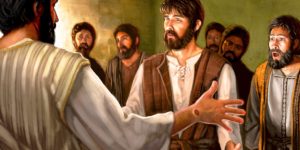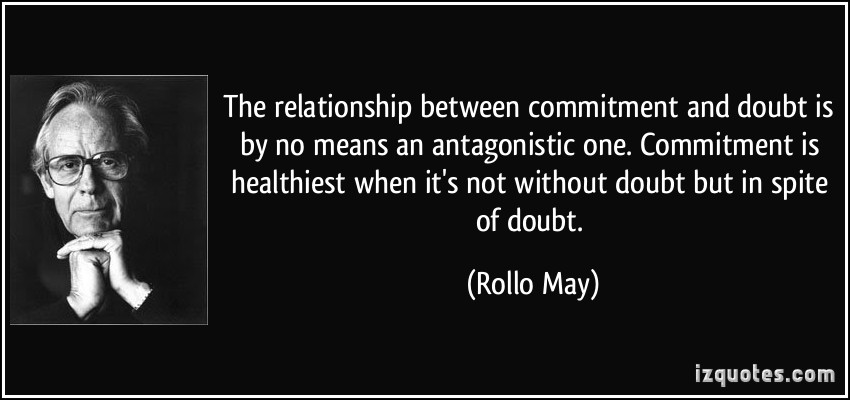The text is below the video.
John 20
19-20 Later on that day, the disciples had gathered together, but, fearful of the Jews, had locked all the doors in the house. Jesus entered, stood among them, and said, “Peace to you.” Then he showed them his hands and side.
20-21 The disciples, seeing the Master with their own eyes, were exuberant. Jesus repeated his greeting: “Peace to you. Just as the Father sent me, I send you.”
22-23 Then he took a deep breath and breathed into them. “Receive the Holy Spirit,” he said. “If you forgive someone’s sins, they’re gone for good. If you don’t forgive sins, what are you going to do with them?”
24-25 But Thomas, sometimes called the Twin, one of the Twelve, was not with them when Jesus came. The other disciples told him, “We saw the Master.”
But he said, “Unless I see the nail holes in his hands, put my finger in the nail holes, and stick my hand in his side, I won’t believe it.”
26 Eight days later, his disciples were again in the room. This time Thomas was with them. Jesus came through the locked doors, stood among them, and said, “Peace to you.”
27 Then he focused his attention on Thomas. “Take your finger and examine my hands. Take your hand and stick it in my side. Don’t be unbelieving. Believe.”
28 Thomas said, “My Master! My God!”
29 Jesus said, “So, you believe because you’ve seen with your own eyes. Even better blessings are in store for those who believe without seeing.”
Reflection on John 20:19-31, The Sunday after Easter (“Low Sunday”)
Sunday April 19th 2020. The Reverend Alan Neale
The first Sunday after Easter is commonly called Low Sunday, maybe in part because the packed crowds we welcomed on Easter Day seem not to have found their way back to church the following Sunday. Low Sunday also because many faithful congregants and clergy often plan a vacation to recover and learn to breathe again after the frantic and holy busyness of Holy Week and Easter.
This Sunday, several weeks on in national lockdown due to the coronavirus, this Sunday will be spectacularly “low” in attendance and yet, over 300 years, I like to think of the hundreds and hundreds who have worshiped in Trinity and in our absence continue the commitment to worship, praise and adoration.
The Gospel for today (John 20) is the much beloved and engaging story of Thomas – sometimes rather naughtily called the “Apostle of Episcopalians”.
The story begins with a description of the frightened disciples huddled together in a secret place and the doors are locked tight for (and I quote) “fear of the Jews”. Fear always tends to put us in lockdown mode not just physically with chains, bolts and security systems but more profoundly emotionally. Fear will often paralyze the tendency to reach out for help, for comfort, for connection.
BUT (underlined, made bold) BUT Jesus moves through the locked door and by his palpable presence and powerful pronouncement endues the disciples with a peace that is truly beyond understanding.
What Jesus did then, He has continued to do even to today in this worrisome, unsettling, fearful times. Please make a little time to sit and rest and ask Him for His word of peace!
The disciples, of course, are overjoyed and elated. They respond with enthusiasm to the presence of Jesus and look in loving and grateful awe at his wounds and then… he leaves.
But soon to take his place is Thomas. We do not why but Thomas was not present when Jesus appeared; collecting supplies, walking to find some relaxation… we just don’t know.
 Now, imagine the scene… Thomas returns and expects to find his brother disciples just as he left them but no, no, nothing is farther from the truth. They probably rushed to Thomas and, simultaneously, shared the precious experience just shared with them. And now imagine how Thomas must have felt… excluded, regretful, resentful maybe even angry? And so, what sounds to me like a fit of pique, Thomas blurts out the most awful statement… “Unless I see and touch the marks, unless I (this is gross) put my hand into his side I WILL NOT BELIEVE”. It really sounds to me somewhat petulant. And I probably would have reacted similarly, so here is no negative judgment merely observation.
Now, imagine the scene… Thomas returns and expects to find his brother disciples just as he left them but no, no, nothing is farther from the truth. They probably rushed to Thomas and, simultaneously, shared the precious experience just shared with them. And now imagine how Thomas must have felt… excluded, regretful, resentful maybe even angry? And so, what sounds to me like a fit of pique, Thomas blurts out the most awful statement… “Unless I see and touch the marks, unless I (this is gross) put my hand into his side I WILL NOT BELIEVE”. It really sounds to me somewhat petulant. And I probably would have reacted similarly, so here is no negative judgment merely observation.
After a week Jesus returns to the secret, locked place and, thank God, Thomas is now with the disciples. As is his wont, Jesus confronts Thomas with his own words of a week before. I am reminded how on the beach in John 21 Jesus confronts Peter with the recollection of his three-fold denial. Although Jesus invites Thomas to reach out and touch the marks, we are not told that Thomas did so. I like to believe that, in a moment, of revelation and connection with Jesus – Thomas saw and believed and that was sufficient.
What is it that makes some of us more prone to doubt than others? For some I think it is almost an innate disposition created years back in our life’s journey. Thomas’ very nickname (Didymus) suggests to me, phonetically, a hesitation to commit. Remember the Greek word for doubt suggests a “wavering from a particular stance or position”. Maybe there is an intuitive sense that good things will only happen to other people; this is not the stance of a beloved child of God and this requires reflection and prayer and conversation to establish how much God is in love with each of us, His creation.
There are many miracles in this story of John 20 but one miracle always stands out to me and it is not always mentioned. This miracle is referred to in verse 26 “eight days later”. For over a week those disciples were able to contain, support Thomas in their group and he, wonder of wonders despite an outburst of vigorous doubt, felt able to remain in their company. It must have been so hard… the blessed ten surely wanted to talk again and again about the Resurrection appearance and yet they controlled themselves for Thomas’s sake.
Both as individuals and as church communities we need to accept that we accommodate both faith and doubt. Thank God we are empowered by Christ to “carry on” enabled, empowered by the power of his presence word of peace.

